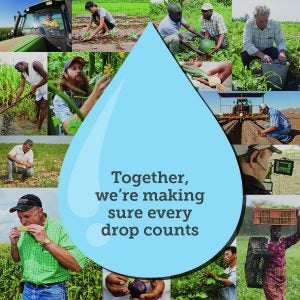Sustainability.
The word is a darling of the environmental movement. It has become synonymous with “going green” and “environmentally-friendly.” We see it everywhere in activist circles: internet graphics, newsletters, organization titles, and marketing materials. There are food labels claiming that products bearing the label are “produced in a sustainable manner.” Even building materials for houses and commercial buildings now claim to be sustainable. If the word sustainability is attributed to a product, program, or organization, there is a general feeling that it must be good.
But environmental activists might be surprised to learn that the word is now being used by some untraditional groups, organizations, and people.
Take, for example, that Monsanto, a company that many environmental activists have demonized, has set sustainability goals for its business and releases an annual report on how it met those goals. Farmers are also starting to embrace the word as an integral part of our business, even if many environmental groups have attacked our production methods for a long time. Even the giant Wal-Mart claims to have sustainable goals for its companies, which it promotes on its company website.
So, what the heck does sustainability mean and how can such opposing groups lay claim to it?
Let’s start with the basics. According to the dictionary, the definition of environmental sustainability is “the quality of not being harmful to the environment or depleting natural resources, and thereby supporting long-term ecological balance.” The official definition seems to match quite closely with the one adopted by the U.S. Environmental Protection Agency. The EPA claims that sustainability is a guiding principle for all of its work. It states that: “[t]o pursue sustainability is to create and maintain the conditions under which humans and nature can exist in productive harmony to support present and future generations.”
Of course, the devil is in the details. Achieving that harmony is exactly where the two sides of the debate part ways. The Sustainable Table, an advocacy organization determined to raise public awareness about industrial agriculture, defines sustainable agriculture as “the production of food, fiber, or other plant or animal products using farming techniques that protect the environment, public health, human communities, and animal welfare. This form of agriculture enables us to produce healthful food without compromising future generations’ ability to do the same.” The organization opposes “industrial” farming that relies on synthetic fertilizers and chemicals and genetically modified crops.
Despite those differences, the definition of sustainability isn’t that far off from how the environmentalist activist’s biggest rival defines the word. Monsanto “believes sustainable agriculture means growing the right amount of food on less land using resources in an efficient manner that preserves natural ecosystems, addresses water scarcity and climate change, improves farmer livelihoods and benefits society.”
It does seem odd that the two sides of the debate both claim to support sustainability, even though they would achieve that goal in diametrically opposed ways. How is that possible?
Perhaps the answer is simply that these goals are naturally inherent for any farmer, regardless of production method, who plans on staying in business for any length of time. The scarcest resource we have is land, which is something that farmers competing for more of it know all too well. If any farmer is going to maintain his business for the long term, he knows that he has to take care of that land and preserve it for the years to come. Common sense tells us that poisoning our fields, depleting the soil, or otherwise rendering it unproductive will ensure that we are looking for a new career path in a short amount of time. The same approach must be applied to any of our natural resources.

The same can be said about another component of sustainability that is usually ignored or downplayed by all the definitions and approaches mentioned: economic sustainability.
There is a persistent myth that anything which is economically beneficial cannot also be good for the environment. Genetically modified crops are the perfect example of why this is a myth: They have increased farm yields and profits, while also decreasing the overall use of pesticides. We cannot expect any industry, including agriculture, to adopt practices that are not economically viable, even if they are better for the environment. While the word “sustainability” or one of its equivalents might put a premium on the price of products today, the process of making a product as such must also be profitable in the long run. Companies cannot pursue sustainability if it means they will ultimately go out of business.
But here again, agriculture is in a unique position to embrace both the environmental and economic sides of sustainability. For as long as humans have been cultivating the land and growing food, farmers have found ways to coexist better with the environment and also stay profitable. That farmers care about long-term economic and environmental sustainability in the land is evidenced by the fact that 97 percent of farms in the United States are still owned and operated by families. There is a treasured tradition in handing down our farm to the next generation. But in order to do so, we have to protect the land and natural resources so that it can continue to be productive and provide for our families.
In reality then, regardless of how one defines the word, agriculture inherently meets the definition of sustainability and will continue to do so.



